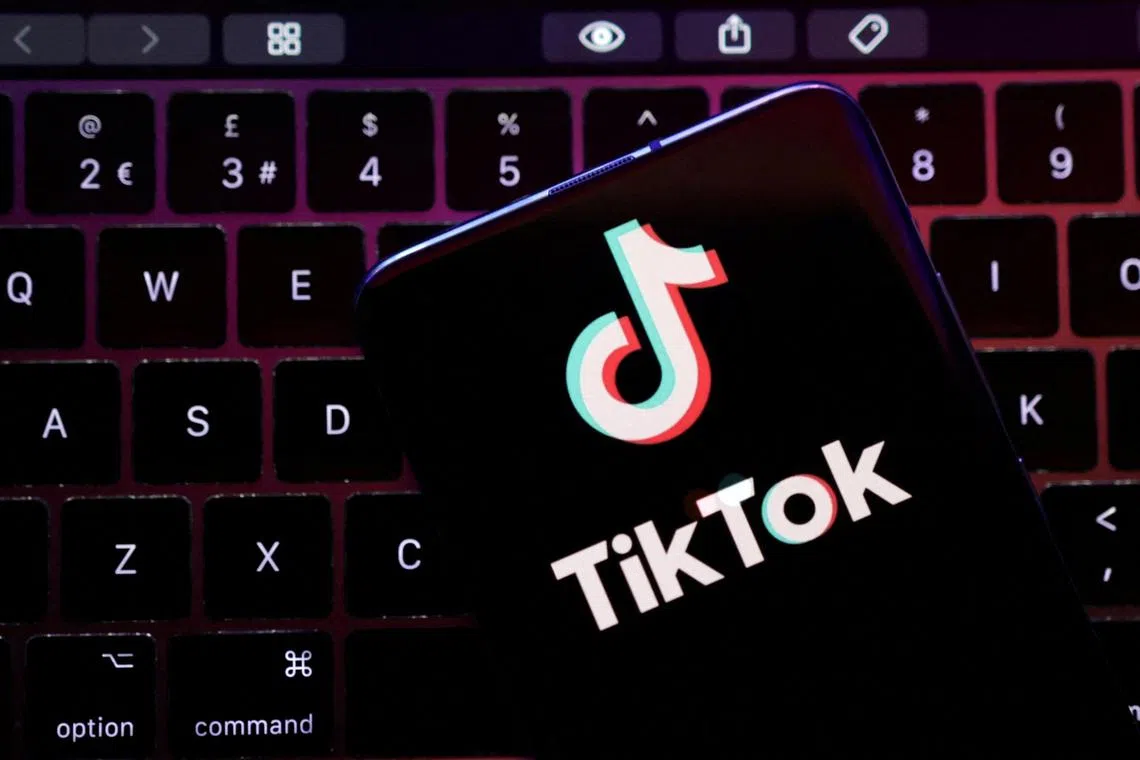US Senate passes Bill to bar federal employees from using TikTok on government-owned devices
Sign up now: Get ST's newsletters delivered to your inbox

US officials are concerned that China could be using TikTok to collect personal data from Americans.
PHOTO: REUTERS
Follow topic:
WASHINGTON - The United States Senate late on Wednesday passed a Bill to bar federal employees from using Chinese-owned, short video-sharing app TikTok
The vote is the latest action by US lawmakers to crack down on Chinese companies amid national security fears that Beijing could use them to spy on Americans.
The Senate action comes after North Dakota and Iowa this week joined a growing number of US states in banning TikTok, owned by ByteDance, from state-owned devices amid concerns that data could be passed on to the Chinese government.
Many federal agencies, including the Defence, Homeland Security and State departments, already ban TikTok from government-owned devices.
“TikTok is a major security risk to the United States, and it has no place on government devices,” Senator Josh Hawley, who wrote the Bill, said previously.
TikTok has said the concerns are largely fuelled by misinformation and it is happy to meet policymakers to discuss the company’s practices. “We’re disappointed that so many states are jumping on the political bandwagon to enact policies based on unfounded falsehoods about TikTok that will do nothing to advance the national security of the United States,” the company said on Wednesday.
Other states taking similar actions include Texas, Maryland and South Dakota.
Every 39 seconds
This comes as researchers said on Wednesday that TikTok appears to be pushing videos about eating disorders and self-harm to 13-year-old users at a rapid clip.
TikTok tailors a stream of short videos to people based on their interests, view times and the accounts they follow.
It starts recommending content tied to eating disorders and self-harm to 13-year-olds within 30 minutes of their joining the platform, and sometimes in as little as three minutes, according to a report from the Centre for Countering Digital Hate (CCDH), a non-profit.
Once young users viewed and liked content about body image and mental health, TikTok automatically recommended related videos to them every 39 seconds, according to the researchers.
To test the app, the researchers set up eight accounts in August, posing as 13-year-olds, the minimum age for users, in the US, Britain, Australia and Canada.
“The pathways into extreme content were so innocuous,” Mr Imran Ahmed, chief executive of CCDH, said in an interview.
“Your eye might be caught by a video of an aspirational body in beautiful clothes, and very quickly the algorithm realises you’re interested in body image.”
Some of the test accounts saw videos promoting “junkorexia”, a slang term for people with anorexia who eat only junk food, and others from users talking about suicide or featuring razor blades.
The researchers found that many videos promoted eating disorders through hashtags using code words in an effort to avoid moderation, and that harmful videos sat alongside more positive ones about recovery.
For example, people have used #EdSheeranDisorder to tag posts about eating disorders while appearing to talk about the pop singer.
TikTok pushed back on the findings of the report.
“This activity and resulting experience does not reflect genuine behaviour or viewing experiences of real people,” said Ms Mahsau Cullinane, a spokesman for TikTok.
“We regularly consult with health experts, remove violations of our policies and provide access to supportive resources for anyone in need.”
Ms Cullinane added that the company’s aim was to build a service for all people, including “people who choose to share their recovery journeys or educate others on these important topics”.
REUTERS, NYTIMES

